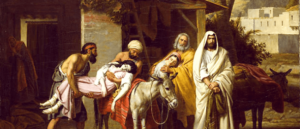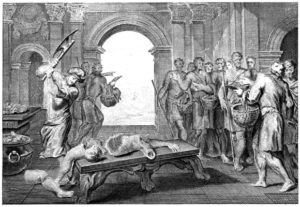 Each year I consider doing a sermon series in October based on Phyllis Trible’s book Texts of Terror: Literary-Feminist Readings of Biblical Narratives.
Each year I consider doing a sermon series in October based on Phyllis Trible’s book Texts of Terror: Literary-Feminist Readings of Biblical Narratives.
Each year I imagine reading these stories in a room with Kindergartners, and I decide to stick with the lectionary texts. There are plenty of Biblical texts that are Not Safe For Church and far from family friendly. There are horror stories in the Bible fit to rival the worst of Stephen King or Shirley Jackson.
In one such story in the Book of Judges, a concubine leaves her Levite husband and moves back in with her father in a neighboring county. I can’t imagine the bravery it must take to leave your husband in that culture. The Levite decides to go get her and bring her home, so he works out a deal with his father-in-law. He never even speaks with his concubine during the story. It reads more like a business transaction than marriage counseling. On the way home, despite being warned against it and encouraged to stop elsewhere, the Levite decides to spend the night in a city in the tribe of Benjamin known for treating outsiders poorly.
After nightfall, the men of the city blockade the home where the Levite and his concubine are staying. Rape is about power, and they want to subjugate what makes them feel most powerful, so they demand the Levite be sent outside to them. Eventually the Levite pushes his concubine outside as a scapegoat in his place to pacify the Benjamite men.
The next morning the Levite wakes up and finds the concubine laying at the front door. How could he sleep at all that night? Clearly this woman is less than human to him.
Finding her at the edge of death and on the door step, the text doesn’t tell us that he throws himself at her and weeps with her. Instead, he steps over her and commands her to get up. It’s no surprise that she dies somewhere between that moment and their arrival back at home. Neither the text nor the Levite know exactly when.

Back at home, the Levite dissects the woman’s body so that he can send a piece to each of the 12 tribes of Israel to show them how poorly he was treated by the Benjamites, and because he wants to raise an army to avenge the inhospitality.
The Levite’s wish is granted, and the tribes unite to march against Benjamin. Tens of thousands of people are slaughtered in the battles to come. After Benjamin is crushed, the tribes swear not to give their daughters to any Benjamite. At the same time, not wanting the tribe of Benjamin to go extinct, the other eleven tribes arrange for the Benjamites to kidnap 400 women from Jabesh Gilead. 
The story ends with the same horror in which it began- the inhuman treatment of women. The concubine was more valuable to the Levite as a martyr than a marriage partner. The women of Jabesh Gilead were persona non grata until they were kidnapped and enslaved by the men of the tribe of Benjamin.
The cycle of violence, abuse and misogyny is perpetuated by men who can’t see past their own interests. Kyndall Rae Rothaus preached a sermon on this text in 2020 that addresses these themes with prophetic imagination, compassion and courage, and you can listen to here. I’m focusing on a piece of this story that’s grown more terrifying over the years which is just how easily the other eleven tribes of Israel get pulled into the violence.

It mirrors some of the mechanisms behind today’s manufactured outrage on social media. Should Lizzo play James Madison’s flute? Should an OU coach get fired because he read the explicit, racial lyrics of his student’s rap song in front of the class? Should The Little Mermaid be played by a Black actor? If I haven’t tweeted my support for Black Ariel, am I really an antiracist?
Here in Norman, a teacher was fired from her job for sharing the QR code to the Brooklyn Public Library since the BPL was giving students across America free library cards and access to digital books that might be banned in their locale.
In response, many liberal do-gooders railed against the public school administrators and the Oklahoma legislature for firing the teacher. Conservative power brokers from the state house called for her teaching certificate to be revoked and for her prosecution for breaking a new Oklahoma law prohibiting what can be taught in classrooms. National news stations rushed in to comment on the story. Sides were drawn and offensive maneuvers were initiated. Another battle in the never ending culture war was being waged in Norman, Oklahoma, and across the nation.
Then, the facts started coming out. The teacher wasn’t fired. The administration never took any punitive measures. Her teaching license wasn’t revoked. No laws were broken.
Many of us were suckered into another culture battle, and for what?
There’s much to be said about the climate our teachers are forced to work in. It’s unreasonable and untenable. There’s a great many ways we could lobby and vote to equip them with the resources and the space to educate our children. I’m embarrassed to live in a state that is stripping public schools of the resources that make this country great. But that’s not what this story is about.
This is one illustration among dozens that could be used in which something spreads across social media inciting outrage and demanding a response. Can you imagine how the eleven tribes of Israel felt when they received a piece of the Levites concubine and were told his version of the story? Outrage and righteous anger kindled. A response must be made. Tens of thousands dead.
At what point did the real version of the Levite’s story start being told? The one where he never cared about the concubine anyway. Never saw her as a person, and is only ever concerned about himself.
 This real story was told eventually since it’s memorialized in our sacred stories. That’s one of the remarkable things about the Bible. When history is written from the side of the victors, Israel preserves criticisms of its own behavior right there in the middle of their sacred stories. Beginning with Moses, almost all of the Old Testament prophets criticize and condemn Israel. And Israel preserves the criticisms as sacred texts in their Bible! It’s unfathomable.
This real story was told eventually since it’s memorialized in our sacred stories. That’s one of the remarkable things about the Bible. When history is written from the side of the victors, Israel preserves criticisms of its own behavior right there in the middle of their sacred stories. Beginning with Moses, almost all of the Old Testament prophets criticize and condemn Israel. And Israel preserves the criticisms as sacred texts in their Bible! It’s unfathomable.
The Levite and the concubine is one such story, I believe. Among many things, it serves as a horrifying reminder of how good impulses like righteous indignation and a hunger for justice can get twisted into serving ignoble purposes. The Benjamite rape of a concubine leads to tens of thousands dead. And in the most bizarre twist of fate, those who are supposed to have the high ground- the other eleven tribes of Israel- end the story by sanctioning the kidnapping and rape of over 400 other women.
The Levite and the Benjamites don’t see the concubine as a human being. None of the men ruling any of the twelves tribes see the 400 women of Jabesh Gilead as human beings. The cycle of violence doesn’t just perpetuate; it grows exponentially.
It’s been said that the line separating good from evil runs right through the middle of every person, and horror stories serve as reminders that we are capable of becoming the very monsters that we condemn.
 I believe that’s why Jesus teaches us to love our enemies. It’s the only way to keep ourselves out of the cycle of violence, vengeance and hatred poisoning God’s good creation. Love of our family, our country, and even our ideals aren’t strong enough to prevent us from anger and violence. What wouldn’t we do to protect our families, our country, and our ideals?
I believe that’s why Jesus teaches us to love our enemies. It’s the only way to keep ourselves out of the cycle of violence, vengeance and hatred poisoning God’s good creation. Love of our family, our country, and even our ideals aren’t strong enough to prevent us from anger and violence. What wouldn’t we do to protect our families, our country, and our ideals?
Loving our enemies is the only power strong enough to stop the violence and vitriol from spinning further out of control. Peace is the way, not the destination, and Love is the only power that can resist evil without becoming evil.
Jakob Topper
Senior Pastor

